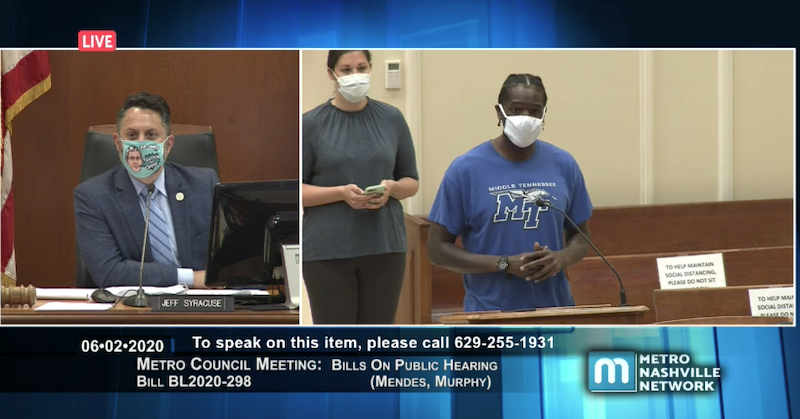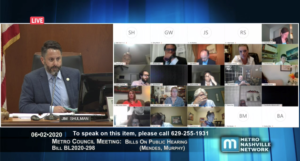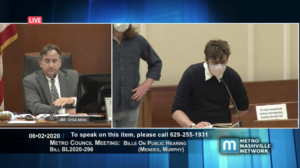
Less money for Nashville police — and more money for education, housing and social services. That was the funding shift requested last night from as many as 200 people who spoke to the Metro Council.
Their persistent message — for more than seven hours — tested the patience of some councilmembers, and strained the public hearing process itself, including a phone system that was filled to capacity.The meeting was ongoing at 4 a.m., with the council yet to take up the bulk of its agenda.
At several moments, including at midnight and 2 a.m., the meeting ground to procedural halts over how to manage the number of residents wanting to speak, as well as questions about whether to cut off repetitive statements, or even to pick up the meeting on another day.
But the coordinated message from speakers was that they were appalled at Metro’s amount of funding for law enforcement, or the idea of increasing it amid the current national climate. The mayor’s drafted budget would increase police funding by $2.6 million, or roughly 1%, as well as provide additional dollars for other public safety agencies.
Many asked the council to seize the moment and try something different.
“You guys are no dummies,” said downtown resident Freeman World, citing the prestigious degrees held by several councilmembers. “Why have all these degrees if we’re going to make the same tired, lame, antiquated decisions when it comes to the city’s budget?
“Let’s not be like all the other cities that spend grotesque amounts of money on police, courts and jails.”
Few attendees mentioned by name the Nashville People’s Budget Coalition, but the talking points and figures were closely aligned, decrying Metro’s spending of nearly half-a-billion-dollars across its public safety agencies. The progressive groups in the coalition advocate for criminal justice reform, transit, affordable housing, workers’ rights and other causes.
Some attendees, like Anna Albescu, of South Nashville, set her pre-written notes aside to ask for funding to heal the community.
“I want to be proud of the city I live in. I want to be proud of my vote for Mayor Cooper,” she said. “This budget … would not make me proud.”
Metro’s call-in system, with a queue of just over 100, was overwhelmed essentially from the start. Dozens ended up driving downtown to speak in person.
Other Messages Squeezed
The critiques of budget priorities almost totally sidelined the question of increasing taxes, which was rarely mentioned before 1 a.m. The council is deciding among several proposals to raise the property tax by varying amounts, and how to allocate the dollars.
A few commenters, including Metro employees, said they supported higher taxes.
 Courtesy Metro Nashville Network
Courtesy Metro Nashville Network The Metro Council held a meeting that lasted over nine hours Tuesday into Wednesday.
One from East Nashville, musician Luke Foley, said he was “totally for raising property taxes.”
“As long as we protect the people that are usually hurt the most by property taxes ,and that’s the people who live in these neighborhoods for years, who get displaced by gentrification,” he said.
A pair of callers sharply opposed higher taxes after 1 a.m., with one calling the possibility “crippling.” At least one caller after 3 a.m., and one after 4 a.m., opposed a steep increase.
Nashville’s school district, meanwhile, is unlikely to get all of the funds that its leaders requested, but educators and parents were among those asking for some upward adjustment.
Marney Pollack, of West Nashville, said she wants to see emphasis on preventative, rather than reactive, services — so less for policing and more for schools.
“The incredible teachers of Metro Public Schools continue to demonstrate their unique ability to arm our city’s children with the power of knowledge, the power of empathy, and the power of advocacy,” she said.
Only one budget option aims above the minimum for Metro Schools. It would raise the property tax rate by 34% to allow for some teacher pay raises, as well as a higher minimum wage for the district.
Procedural Turmoil
In hosting the once-per-year budget hearing, the large attendance strained the council, including Vice Mayor Jim Shulman, who presides over the meeting.
Shulman typically convenes diverse viewpoints and strives for more public understanding of local government. But after more than four hours of sometimes identical comments, he moved to suspend the public hearing.
The decision came shortly after a morose — but poetic — comment from Maxwell Putnam, of Madison, who said he was intent on repeating earlier speakers.
“I wish to repeat them until they are undeniable. Until it seems crazy that we considered anything else,” he said. “We reject anything that resembles this budget. And I wish to repeat it until it is your first thought every morning and your last thought every night.”
 Courtesy Metro Nashville Network
Courtesy Metro Nashville Network Maxwell Putnam, of Madison, said he opposed “anything resembling” the current budget proposals.
After a few more speakers, Shulman recessed the meeting.
He was then filmed in the hallway chastising people who were waiting to speak, saying that they were engaged in “bad politics.” He was booed.
Shulman said an array of constituents had been unable to share differing opinions.
“I think the points made today have been very, very effective, but we have heard them,” he said.
He tried to push the remainder of the public comment period to the end of the meeting, after other council business. But councilmembers intervened and essentially overruled Shulman.
“Now they’re going to feel disrespected,” Councilmember Angie Henderson told Shulman. “I don’t think it’s reflecting well on our body.”
Other members expressed weariness, but the meeting was still underway at 4:45 a.m., easily making it the longest council meeting of the decade.
Councilman Steve Glover blasted the process as “extremely flawed,” and suggested that many residents opposed to higher taxes were unable to be heard.
“I’ve never seen such a fiasco in my life.”

